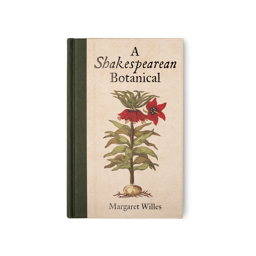A Shakespearean Botanical by Margaret Willes
Book
Smelling Shakespeare

‘Following in the tradition of Renaissance herbals, this beautifully illustrated guide pairs contemporary botanical knowledge with Shakespeare’s words and the medical, gardening and cooking context of the time.’ - Rose Byfleet Renaissance Perfume Expert
This book is recommended for the Perfume Library by Renaissance Perfume expert Rose Byfleet when she helped Lush develop Lush's Renaissance Spa treatment. This spa treatment features Lush's Renaissance Collection perfumes.
When Falstaff calls upon the sky to rain potatoes in The Merry Wives of Windsor, he is highlighting the late sixteenth-century belief that the exotic vegetable, recently introduced to England from the Americas, was an aphrodisiac. In Romeo and Juliet, Lady Capulet calls for quinces to make pies for the marriage feast of her daughter. This fruit was traditionally connected with weddings and fertility, as echoed by John Gerard in his herbal where he also explained that eating quinces would 'bring forth wise children, and of good understanding'.
Taking fifty quotations centring on flowers, herbs, fruit and vegetables, Margaret Willes gives these botanical references their social context to provide an intriguing and original focus on daily life in Tudor and Jacobean England, looking in particular at medicine, cookery, gardening and folklore traditions. Exquisitely illustrated with unique hand-painted engravings from the Bodleian Library's copy of John Gerard's herbal of 1597, this book marries the beauty of Shakespeare's lines with charming contemporary renderings of the plants he described so vividly.
Fighting animal testing
We have been fighting against animal testing since before we opened our first shop, and the fight continues today. We test products on humans and promote, fund and use human biology relevant testing methods entirely animal and animal-product free. Find out more
Homepage -